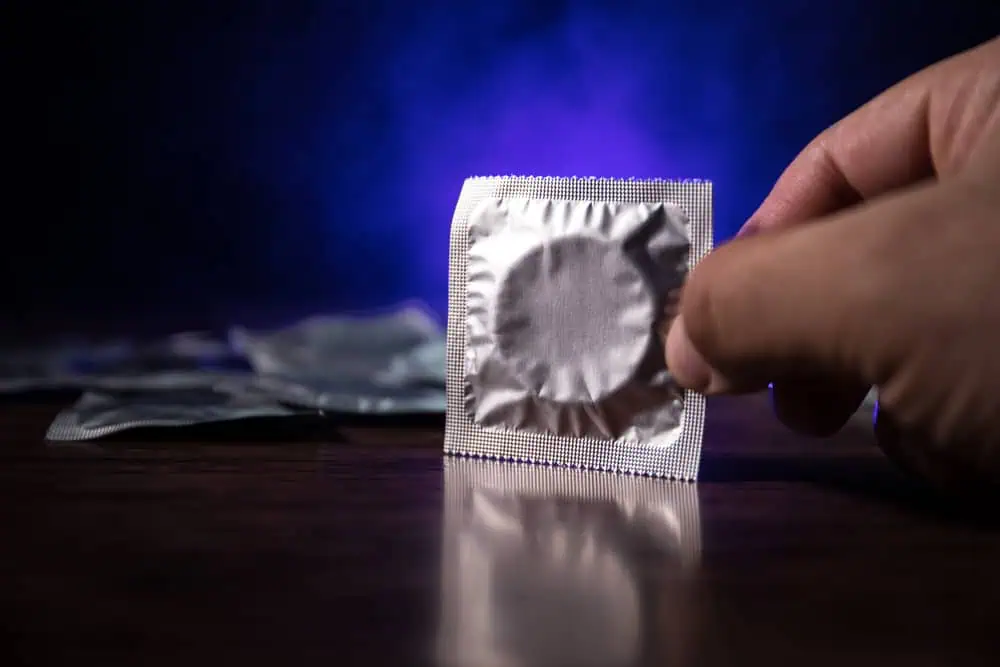
Everything You Need to Know About Condoms
Hopefully most of us know by now that condoms make sex safer. But there’s a lot about these little pieces of latex that you might not know. That’s why we wanted to put everything you need to know about condoms into one place, bust some myths, and answer your questions.

What exactly is a condom and what is it for?
A condom is a type of barrier protection for sexual health purposes. It is a sheath of latex (or other material, more on that in a minute!) that fits over the erect penis during sex. It prevents sperm from entering the vagina, anus, or mouth of the receptive partner, preventing pregnancy and sexually transmitted infections (STIs.)
What about female condoms?
Female condoms also exist, but are much less common. We’re going to focus on male condoms today, but if you want to learn more about female condoms (also known as internal condoms) this is a great resource.
How effective are condoms?
With proper use, condoms are about 98 percent effective at preventing pregnancy. That means that if you use condoms perfectly, two out of every 100 women using them will become pregnant in any given year. However, with “typical” (imperfect) use, they’re around 82 percent effective, which means that 18 out of 100 women will become pregnant within a year of use.
Condoms are the only contraceptive method that protects against STIs such as gonorrhea, syphilis, HIV, and chlamydia. For that reason, it’s vital that you use one. Remember that many people have STIs and experience no symptoms, so the only way to know for sure that you do not have one is through a full sexual health screening.
Can I use condoms alongside other birth control methods?
Absolutely, and if you or your partner is capable of becoming pregnant, we recommend that you do! Condoms can be safely used with any other method of birth control including an IUD (“coil,”) contraceptive Pill, patch, injection, or implant.
Do I need to use condoms if I’ve had a vasectomy?
Yes. A vasectomy means that you can no longer get a partner pregnant, but you can still transmit – and catch – STIs. Therefore, you should still use a condom unless you’ve taken other precautions to minimize STI risk (see below.)
Do I need to wear a condom for anal sex?
Yes. Although anal sex cannot lead to pregnancy, it carries a slightly higher risk of STI transmission than other types of sex – particularly for the receptive (bottom) partner. Wearing a condom is a responsible choice to protect both you and your partner.
Do I need to use a condom for oral sex?
Maybe.
The answer to this is a little less clear-cut. That’s because there is a risk of transmitting or catching an STI from performing oral sex on a penis (fellatio or a “blow job”) but that risk is lower than for vaginal or anal sex.
For HIV, for example, the risk level is around 0.04 percent in “high risk” gay and bisexual men ( source.) But STIs such as gonorrhea, herpes, and human papillomavirus (HPV) are more readily transmissible through oral sex.
It is up to you and your partners to decide whether barrier-free oral sex is too risky for you or not. We’d recommend using a condom, though. It’s always better to be too safe than not safe enough! Pro tip: many condoms have an unpleasant taste, but flavored ones are designed specifically for oral sex.
By the way: despite urban myths you may have heard in high school, you absolutely cannot get pregnant through swallowing sperm.
I’m allergic to latex, are there other options?
Yes. Latex allergies are very common and latex isn’t the only option when it comes to sexual barriers. Check out our selection of non-latex condoms, such as Skyn’s polyisoprene condoms.
Condoms feel too small or too big for me!
Condoms come in different sizes. That’s because penises come in different sizes – one size doesn’t fit all! It’s important to wear the right sized condom. If you wear one that is too small, it is more likely to break. And if you wear one that is too big, it is more likely to slip off during sex. This defeats the whole point of using them in the first place.
Many men are embarrassed about buying condoms in different sizes. Don’t be! Safer sex is essential, and taking responsible steps to protect yourself and your partners is sexy. Remember that buying from an online sex shop like Jack and Jill is discreet and private.
We like Kimono’s large condoms for a more generous fit.
When is it okay to stop using condoms?
Some couples make a mutual decision to stop using condoms. This might happen when they’re in a long-term relationship or are no longer having sex with anyone but each other.

Some polyamorous and swinger couples also decide not to use condoms between the primary couple, but still use barriers with others. This can be a purely pragmatic decision but can also be used to indicate a degree of primacy or specialness in that relationship.
Ultimately, it is up to you and your partner(s) to decide what makes sense for you when it comes to condom use. Everyone has different levels of risk acceptance and aversion. Open communication and honesty are essential.
We advise that you only stop using condoms when you have another method of birth control in place and when both/all of you have had a negative STI screening.
What if a condom breaks?
Even with perfect use, a condom will occasionally break. It’s less common than you might think, but it does happen. For that reason, we recommend using condoms alongside another method of birth control (such as the Pill or an IUD) and having regular STI tests, especially if you’re not in a long-term, monogamous relationship.
If a condom breaks during vaginal sex, the receptive partner will need to get emergency contraception (the “morning after Pill”) within 72 hours. Access to emergency contraception varies between cities, states, and countries, so it’s a good idea to know how to access it in your location before you’re in a situation where you need it.

Anything else I need to know about condoms?
Let’s finish by busting a few common condom myths and answering some FAQs:
- Never reuse a condom. They are single-use items.
- Using two condoms together does not make sex safer.
- In most places, you can buy condoms at any age. You can also sometimes get them for free at places like sexual health clinics, your primary care doctor’s office, and some youth centers and LGBTQ+ community organizations.
- Condoms do have expiration dates, and you should never use an expired one.
- Don’t keep a condom in your wallet or pocket. Friction and heat in these places can degrade the quality of the condom, making it less effective.
- Do not use oil-based lubes with latex condoms, as this can degrade the latex and cause it to break. Water-based lube is best.
Remember: use a condom every single time you have sex, unless you and your partner have negotiated otherwise and taken appropriate safety precautions.
Conclusion
If you’re using them properly and wearing the right size, they don’t drastically impede pleasure. And a small decrease in sensation is far better than an unwanted pregnancy or an STI.
Did you learn anything new about condoms here? Do you have a favorite brand? Share with us in the comments below!
